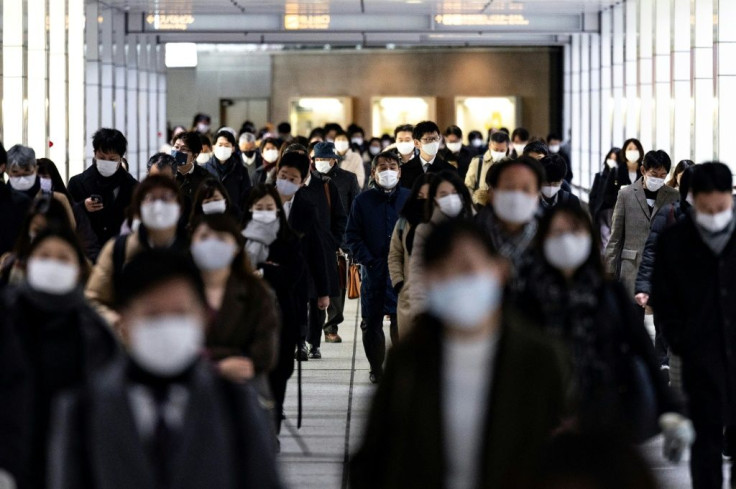Tokyo Shares Sink On Expected Virus Emergency
Tokyo stocks began the new year in volatile form, starting the Monday session up but quickly sinking on reports Japan may call a state of emergency over surging coronavirus cases.
The benchmark Nikkei 225 index started the first trading day of the year up 0.53 percent but within an hour it was down 1.07 percent, or 292.88 points, to 27,151.29.
The broader Topix index, which had also started higher, gave up 1.32 percent, or 23.80 points, to 1,780.88.
The dollar stood at 103.05 yen, compared with 103.28 yen seen Thursday in New York ahead of the new year break.
The volatile start came as local media widely reported that Prime Minister Yoshihide Suga was considering issuing a regional state of emergency for Tokyo and surrounding areas as the nation continues to log record numbers of daily coronavirus infections.
Regional governors, including Tokyo's Yuriko Koike, on Saturday jointly urged the national government to declare a state of emergency to slow the spread of Covid-19.
But the pandemic has already caused severe economic suffering to many people, and Suga has been reluctant to issue fresh measures that could further damage the economy.
Analysts have generally kept an optimistic outlook for the Japanese market in the long run, although they warned about a possible correction phase through March after strong gains seen in recent weeks.
"The market opened with buy orders leading the way," Okasan Online Securities said in a note.
"But many investors wanted to monitor the spread of the coronavirus infections as well as the outcome of the US Senate runoff elections."

"Once the initial buying subsided, the market faced pressure," encouraging investors to wait for the next opportunity to return to buying, Okasan added.
The Nikkei index may head toward 30,000 by September, Rakuten Securities said, with the coronavirus vaccines helping to normalise the global economy and encourage global investors.
But it could experience a correction through March, following sharp gains seen toward the end of last year, Rakuten added.
"All in all, Japanese shares are still attractive, and we expect buy orders will dominate the market in a long run," it said.
Okasan also said it expected the Tokyo market to generally "keep performing" this year.
"The global economy in 2021 should move gradually toward normalisation... With excessive liquidity, the market's upward momentum should strengthen further," the brokerage said.
Okasan added that many people might still feel hesitant about getting coronavirus vaccine shots, making their effectiveness at eradicating the pandemic lower than many had hoped.
Many blue chip issues gave up early gains and plunged into negative territory. Nintendo fell 1.20 percent to 65,040. Toyota lost 0.65 percent to 7,905 yen. Uniqlo-operator Fast Retailing gave up 0.97 percent to 91,570.
Construction equipment maker Komatsu fell 1.83 percent to 2,766.
Some firms managed to stay in the black. Sony added 0.63 percent to 10,350 yen. Major logistics firm Yamato Holdings rose 0.15 percent to 2,635.
© Copyright AFP 2024. All rights reserved.





















